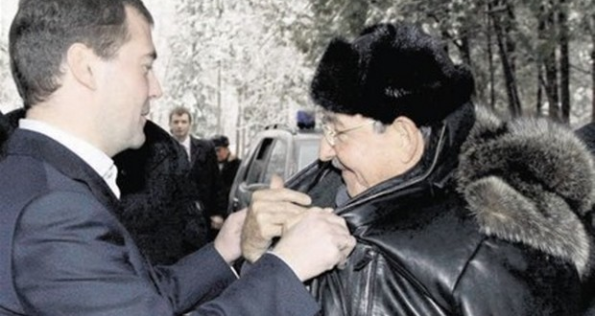 It’s hard to bury faith in any God, ideology, or vices. For others, like Vladimir, the passion for the Soviet era, like old rockers, never dies.
It’s hard to bury faith in any God, ideology, or vices. For others, like Vladimir, the passion for the Soviet era, like old rockers, never dies.
Son of Communist parents, he studied at universities in the former USSR. He speaks Russian like a Muscovite and still reads Gorki or the poems of Yevstushenko in the original language.
On a pine shelf he has a bunch of Soviet writers in the style of Borís Polevói, Nikolái Ostrovski, Mijaíl Shólojov or Ilya Ehrenburg, who wrote the epic of the Red Army in World War II.
Vladimir is not considered a fanatic. In his room there are no canvases of Stalin, Marx or Lenin . “The USSR may seem like an old newspaper. But it is not dead yet. In Cuba people don’t find Russian cartoons or corned beef strange. It is in the power structures where still latent are certain mechanisms of the Soviet era.”
Dismantling this shed is an arduous task. A vertical government, omnipresent secret police, a broad sector of the planned economy and the usual unanimity of approving laws in the boring national parliament, are vestiges of the official Soviet Cuba that resists death.
Cubans like Vladimir worked for years on building institutions modeled on the Soviet Union. From the Constitution to the Pioneer organizations.
“All of us who believed in the USSR assumed that the short-term future was Communism. And that the disappearance of capitalism was a question of time. But it wasn’t. Now Putin’s Russia is as imperialistic as the United States,” says the nostalgic Havana Communist
There is very little left of the USSR among ordinary Cubans. Some Slavic names, drinking vodka and orange juice, and hundreds of marriages that still remain from that Red era.
Not a few of regime’s officials feel nostalgia for the past. It was a golden era where rubles were wasted and the armies had the most current versions of conventional Russian armaments.
From the USSR came oil, fertilizers and tractors. Magazines, books and movies flooded the country. Then, it was in good taste to hang portraits of the current Soviet leader at the same level as those of Fidel Castro.
The current president, Raul Castro, had an enormous portrait of Stalin, the butcher of Georgia, in his office at the Ministry of the Armed Forces.
What remains to be seen is if the Castros were Communists of convenience, or chose the ideology to cling to power. The quirky Euro-Asiatic system had irresistible charms for any apprentice autocrat.
There were no presidential elections. Nor free press. Nor independent unions. Justice was administered by the State. And they created a competent political police, dissident citizens could complain only in their own living rooms, or leave on a raft.
The love story between the USSR and an intellectual and political sector of Cuba is longstanding. Many who swear they are firm nationalists, accuse those who admire the U.S. lifestyle are accused of being “annexationists.”
But Communism is the first of all annexations, the importing of Marxism-Leninism and wanting to clone the Soviet model on a Caribbean island 6,000 miles from Moscow.
And it wasn’t the illiterate or stupid who were applauding the theory of a Soviet Cuba. Within the ranks of the People’s Socialist Party (PSP), intellectuals such as Juan Marinello, Carlos Rafael Rodríguez, Salvador García Agüero and Nicolás Guillén stood out.
With the coming to power of Fidel Castro, political opportunism coupled the Communist imagination of tanned men of Cuban unionism, and the Marxist proselytizing in various academic and intellectual sectors.
Before 1959, the PSP branded Castro a gangster, sucker, and petty bourgeoisie. According to Anastas Mokoyan’s son, who accompanied his father on the visit of a Soviet delegation to Havana in February 1960, witnessed the following dialog between Fidel and Ernesto Guevara:
“They (Castro and Guevara) said that they could only survive with Soviet help and would have to hide this from the capitalists in Cuba… Fidel said: We have to cope with these conditions in Cuba for five or ten years. Then Che interrupted him: If you don’t do it in two or three years, it’s over.”
The rest of the story is known. Castro Sovietized the island and 55 years alter, the main political institutions of the State continue using their methodology. From the special services to diplomacy, which when it aligns itself with a partner, approves political expansionism like Putin in Crimea, or joins with repugnant dictatorships only because they are the enemies of their enemy.
The current labor legislation — which still hasn’t been officially published — or the aberrant Foreign Investment Law, demonstrated that the current Cuban government only considers its people as an instrument to legitimate their tepid economic reforms and not to benefit them.
Separating from an ideological faith is too costly. Even when the reality shows its inefficiency.
Iván García
Photo: January 2009. Then Russian president Dmitry Medvedev buttoning the coat that he had just put on his counterpart, Raul Castro, before the beginning of the informal talks at a residence in Zavidovo, north of Moscow. It had been 24 years since a high Cuban leader had visited the former Soviet Union. Taken from Listín Diario.
18 May 2014
